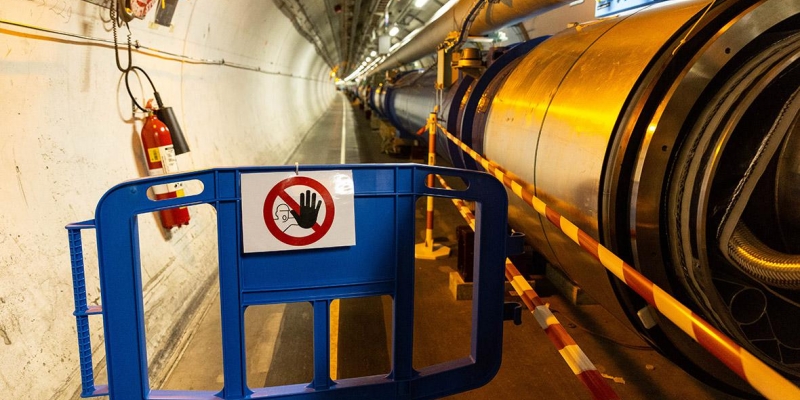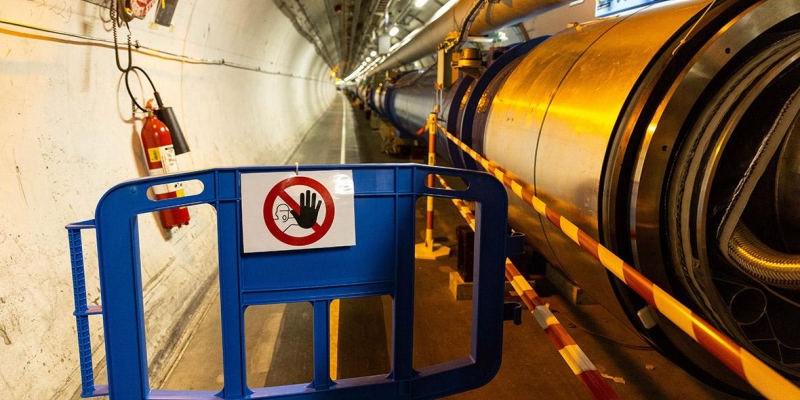Gguardian: a number of scientists do not want to indicate colleagues from Russia in their work on the Hadron Collider The publication of more than 70 studies on the Large Hadron Collider is delayed due to disagreements at CERN about how to indicate the authorship of scientists from Russia and Belarus in scientific papers

A deadlock has arisen in the European Organization for Nuclear Research (CERN) due to the fact that some scientists oppose the designation of Russian researchers as co-authors of their scientific papers, writes The Guardian.
As the newspaper notes, usually a lot of scientific articles about experiments at the Large Hadron Collider (LHC) are published during the year; thousands of scientists and engineers participate in projects. However, in March 2022, after the outbreak of hostilities in Ukraine, the number of published works on the LHC fell to zero. The reason is that CERN cannot agree on how to indicate the authorship of scientists from Russia and Belarus (this is about 7% of the participants) and whether to indicate them at all.
CERN came to a temporary compromise— not to publish these works yet. At the same time, the articles continue to be prepared, they are sent for review. According to the Guardian, more than 70 studies have not been published yet. Preprints of the papers can be found on the arXiv server, but there is no list of authors and organizations funding the research. RBC sent a request to the CERN press center.
“There really is a delay. About 70 or more, less— I don’t know. An important point is that the disagreements are not at CERN, but in different scientific collaborations, each of which includes groups from many countries and institutions. As far as I understand, CERN has stated that it will make the decision of the collaborations. At the moment there have been votes on several options, nonethe option was not supported by the majority. So, as far as I know, there is no agreement yet. Unfortunately, I don’t remember the details of each of the options, so I can’t give you any specifics. I also don’t know what options will be offered in the future,” Ivan Polyakov, an employee of the LHCB collaboration, Candidate of Physical and Mathematical Sciences, told RBC.
According to physicist Fyodor Ratnikov, it has not yet been possible to develop new publication rules that would suit everyone. He said that for his Ukrainian colleagues, “this issue is, of course, extremely painful,” but most of them “do not shift responsibility” for what is happening in Ukraine to Russian scientists. “I would say that some of my colleagues from the EU are much more radical,” Ratnikov noted.
So far, the situation has not greatly affected the financing of research or the awarding of scientific degrees, the publication notes. However, a professor from the University of Delhi, Brajesh Choudhary, a participant in one of the experiments at the LHC, warns that a further delay in publications will lead to “many problems” for scientists.
Read on RBC Pro What is hypersensitivity and how it helps a career — Quartz The labor market has shaken again: which top managers are now in price, Which Russian brands will find it easier to replace others with foreign ones To prepare for layoffs: what the IT labor market is waiting for in 2023
CERN consists of 23 countries, Russia and Ukraine are not among them. In March 2022, the organization deprived Russia of observer status, and in the summer decided not to renew cooperation agreements with Moscow and Minsk after their expiration dates in 2024.
Authors Tags Subscribe to RuTube RBC Live broadcasts, videos and recordings of broadcasts on our RuTube channel

